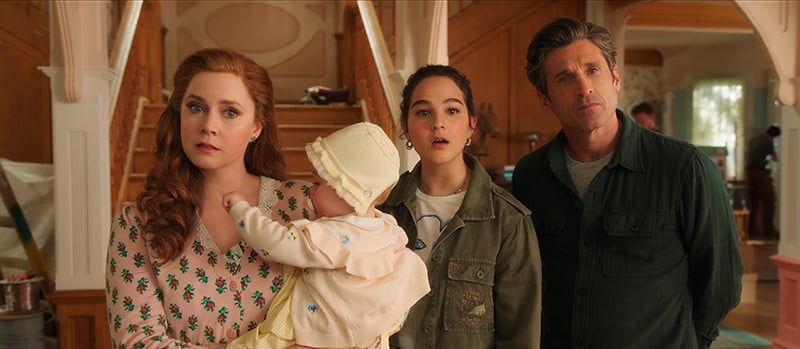By Vanessa Marr
Mothers in fairy tales have a way of being absent, typically through untimely deaths (think Cinderella, Snow White or Beauty and the Beast) or thanks to storylines that position them as background characters. Disney’s Disenchanted turns this on its head. Here, at last, we have a fairy tale where mum takes centre stage, as well as left and right, as Good Mother, Wicked Stepmother, and the ever-entertaining and power-hungry Queen Mother.
Usually, fairy tales end when the princess gets her guy, as it did in the first film, Enchanted. But this sequel shows what happens next, following the lead character Giselle who is blissfully married to her true love Robert. She’s raising their new baby Sofia and her now teenage stepdaughter Morgan. But happiness is not quite all it promised to be. Teenagers are hard work and so are babies – something needs to change.
Luckily, they manage to escape to suburban Monroeville. But as it becomes clear the move wasn’t enough, and in a wish gone wrong, Giselle turns Monroeville into a disastrous magic land where everyone in town is restricted by the script laid out in fairy tales.
Many parents will see themselves and their everyday battles mirrored in Disenchanted. Somewhat frustratingly, however, age-old expectations persist, as Disney is still inclined to pedal the post-war ideals of father-provider and mother-nurturer, even while embracing a more modern blended family.
At the heart of Disenchanted is the tension between mother and stepchild. The teenage angst is directed at Giselle, who Morgan blames for ruining her life. Her father, however, gets none of the flack and dismisses Giselle’s worries before making himself scarce.
This is a big deal in fairy tales, as mothers play very specific roles.
Biological mothers who are still alive are rare. These women are made out to be the very model of goodness. Their main goal in life is to become a mother – a womanly desire Disney and fairy tales applaud even though it too often ends in horrible ways (Snow White).
Evil stepmothers on the other hand bring excitement, peril and adventure. These women are biological mothers or mothers by marriage but their main goal is often to be more and to have more. Their ambition tends to divert protagonists off their paths and get them into trouble.
The self-interested version of a stepmother-cum-witch allows readers and audiences to explore her badness while remaining secure in the knowledge that “real” mothers are safe and to be trusted.
Disenchanted attempts to flip the script on this. Giselle is both a “real” mother and a stepmother. So when Monroeville transforms into a magic land and the laws of fairy tales come into play, it’s not so clear cut which way this mother will go.
A battle between good and evil plays out as the two sides, real mother and step mother, tussle for control over Giselle.
Giselle flits from Cinderella’s stepmother to Rapunzel’s captor (whom she also called mother) as she grows increasingly wicked and more power hungry. But is ambition really the worst crime a mother can commit? Disenchanted seems to think so.
When we are introduced to Giselle she is pitched as the perfect woman. Giselle becomes less than perfect when ambition gets in her way.
Where the film does challenge fairy tale tropes is in the question of the strength of a mother’s love, particularly for those she has not birthed herself. Ultimately Disenchanted is a tale of the love between stepparents and stepchildren and the importance of celebrating that unique connection. It is in the “real” world where this love can thrive, making it clear that fairy tales aren’t always what they are cracked up to be and the real magic can be found in family.
Vanessa Marr is Principal Lecturer in School of Art and Media, University of Brighton. This article is republished from The Conversation under a Creative Commons licence







Click here to change your cookie preferences